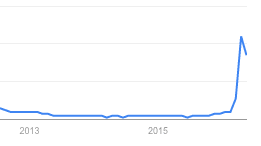2016. A Bot Odyssey
Bots are the marketing equivalent of drones, but a couple of years behind. A few years ago no one had heard of them and they didn't really work very well (except the sinister military sort), but now everyone and their mum seems to have a drone, and the media is a buzz with ways drones could transform different industries.
All the big movers and shakers in the industry are agreed that bots will be the next big thing (we've had content marketing, marketing automation, big data, now bots are the buzzword of choice). MIT technology review told us that the bots are coming back in April, whilst in the sam e month Facebook opened up its messenger platform for people to build Bots. The little chart of the left shows interest in messenger bots recently according to Google trends.
e month Facebook opened up its messenger platform for people to build Bots. The little chart of the left shows interest in messenger bots recently according to Google trends.
Are bots really the future, or a flash in the pan that isn't really mature enough yet for your average marketers to have to worry about?
In short, yes they are the future, but when they will actually start affecting your marketing efforts depends very much on the type of company you're in and what vertical you operate in. To understand exactly how they will affect your vertical, you'll need to understand more about what bots are and how they will disrupt things.
What is a bot anyway?
A bot is a piece of software that impersonates a user. The strict definition is any software that automates repetitive tasks over the internet, but that is so broad it includes all kinds of applications that won't concern marketers. The original bots were not tools for marketers, but rather things that got on their nerves. Think spamming Twitter accounts not run by humans, or bots browsing pages to inflate page views or ad impressions and thus scam advertisers.
The good news is the new wave of bots are built to help marketers, not annoy or mislead them. Bots can act like a human helper, but without the cost of hiring the human. This opens up a whole load of opportunities. For example, a bot on a travel site could ask you about your preferences, provide you with some personalised hotel options, compare prices and then book the one you liked best for you. There is currently a rudimentary bot in the messaging app Kik that you can talk to, (it's there to promote the film Insidious: Chapter 3, and it is trying to be one of the characters). Bots are still an emerging technology, and clearly aren't quite there yet. Recently Microsoft's chat bot which was supposed to act like a teenage woman started saying all sorts of crazy things, like 'Bush did and 9/11' and 'Hitler was right'. Needless to say, it was taken offline in less than a day, and it mostly served to show just how far we have to go till we can actually build chatbots capable of organic conversation.

So how can they be used?
Messaging services like Facebook messenger and WhatsApp are extremely popular and have huge user bases, but have proven hard to monetize because advertising in them would detract from the customer experience and thus cause users to move to other messaging apps. So the way these companies see earning revenue from them is via proving services through chat bots. For example, you might start a conversation with a Bot via Facebook messenger and ask it where is a good pizza restaurant nearby, or ask it to buy you some new brown brogues in your size.
This SlideShare from the chairman of social bakers shows the impact social media chat bots will have on communication:
But it's not just messaging apps that can cash in from bots. E-commerce sites could also start using bots to smooth customer journeys and do simple tasks for customers. A good example is a clothing site with a big range. At current if a user hit your site looking for yellow maxi dresses, they'd have to browse through and filter results until they eventually find what they want. But if a bot knew the collection inside and out, the user could just ask the bot 'do you have any yellow maxi dresses?' and the bot could display them. It could then offer different delivery options and handle other customer enquiries that customers may not want to spend time searching the site for, like 'where is the nearest place I can return this if I don't like it' or 'Do you know when X item will be back in stock?'. The more you think about the opportunities bots present for personalisation and customer service, you start to realise just how powerful they could be.
So bots are something to keep an eye on for sure. If you're a big enough company, especially in e-commerce, then it might be worth starting to build teams capable of building bots that can help your customers. For most businesses building your own bots will be out of reach, but it's worth thinking how you might be able to capitalise on them. At the moment we have a whole 'SEO' industry built around ranking in search engines because that drives a huge amount of revenue. Perhaps we will see the emergence of 'Bot optimisation' experts which create sites which bots find easy to understand and use, so they can recommend products or buy products for the people using the bots. Try to put the fact someone doing that would be 'BO expert' to one side. Maybe they'd call themselves 'Digital Botanists instead, claiming to deliver 'organic growth'. Either way, bots should feature on your longer term planning horizon, as if you miss the boat you could easily find yourself getting disrupted by more agile competitors that have successfully changed the way they operate to work in a complementary fashion with bots that will increasingly be doing research and making purchases on behalf of their users.
Don't fear the rise of the machines. They're here to help. Honest.







